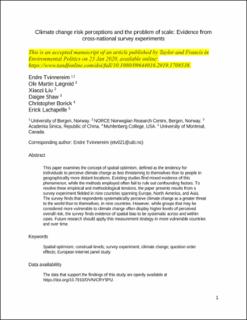Climate change risk perceptions and the problem of scale: Evidence from cross-national survey experiments
| dc.contributor.author | Tvinnereim, Endre | |
| dc.contributor.author | Lægreid, Ole Martin | |
| dc.contributor.author | Liu, Xiaozi | |
| dc.contributor.author | Shaw, Daigee | |
| dc.contributor.author | Borick, Christopher | |
| dc.contributor.author | Lachapelle, Erick | |
| dc.date.accessioned | 2020-04-01T09:57:14Z | |
| dc.date.available | 2020-04-01T09:57:14Z | |
| dc.date.created | 2020-01-31T15:31:29Z | |
| dc.date.issued | 2020 | |
| dc.identifier.issn | 0964-4016 | |
| dc.identifier.uri | https://hdl.handle.net/11250/2649836 | |
| dc.description.abstract | We examine the concept of spatial optimism, defined as the tendency for individuals to perceive climate change as less threatening to themselves than to people in geographically more distant locations. Existing studies find mixed evidence of this phenomenon, while the methods employed often fail to rule out confounding factors. To resolve these empirical and methodological tensions, we present results from a survey experiment fielded in nine countries spanning Europe, North America, and Asia. The survey finds that respondents systematically perceive climate change as a greater threat to the world than to themselves, in nine countries. However, while groups that may be considered more vulnerable to climate change often display higher levels of perceived overall risk, the survey finds evidence of spatial bias to be systematic across and within cases. Future research should apply this measurement strategy in more vulnerable countries and over time. | |
| dc.language.iso | eng | |
| dc.title | Climate change risk perceptions and the problem of scale: Evidence from cross-national survey experiments | |
| dc.type | Peer reviewed | |
| dc.type | Journal article | |
| dc.rights.holder | 2020 Informa UK Limited, trading as Taylor & Francis Group | |
| dc.description.version | acceptedVersion | |
| cristin.ispublished | true | |
| cristin.fulltext | postprint | |
| cristin.qualitycode | 1 | |
| dc.identifier.doi | 10.1080/09644016.2019.1708538 | |
| dc.identifier.cristin | 1788643 | |
| dc.source.journal | Environmental Politics |
